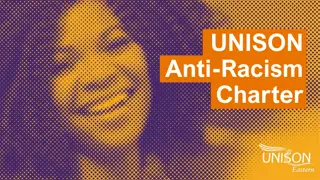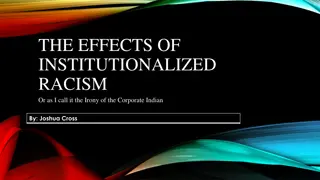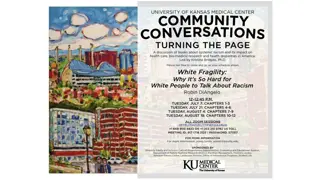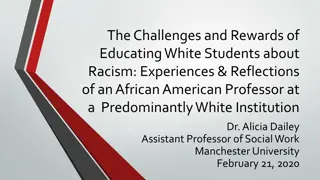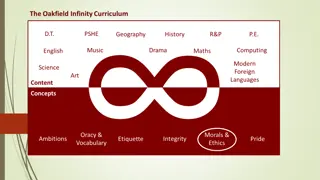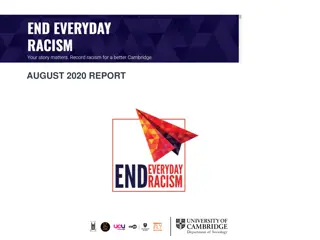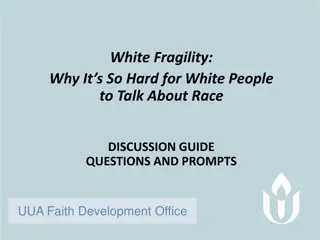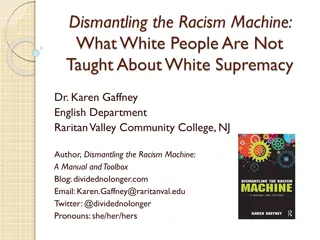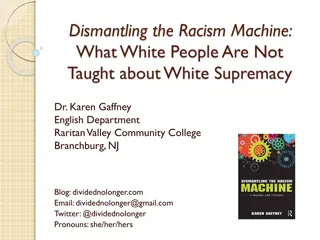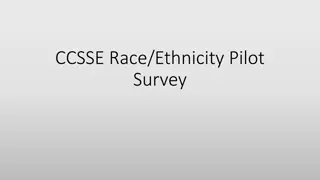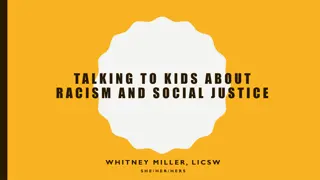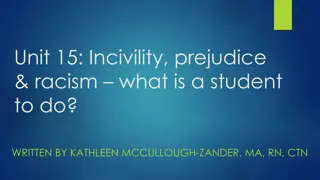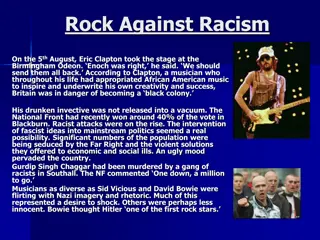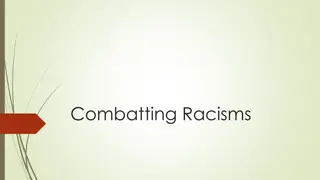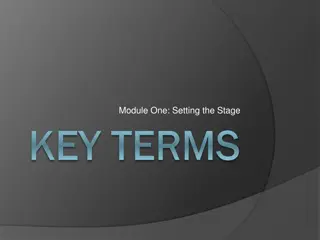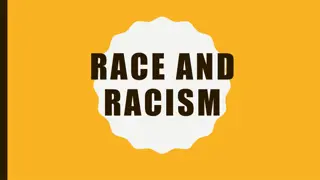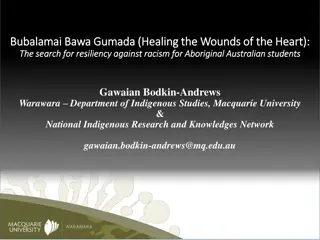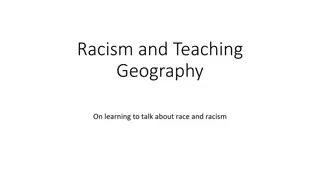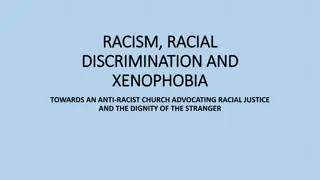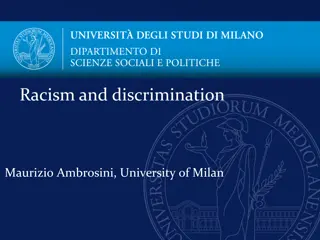Understanding White Fragility and Racism: Insights from "White Fragility: Why It's So Hard for White People to Talk About Racism" by Robin DiAngelo
Exploring the challenges white people face in discussing racism, "White Fragility" by Robin DiAngelo sheds light on the systemic issues shaping our lives. It emphasizes the need for white individuals to confront their role in upholding racism, strive for racial humility, and work towards interrupting these structures. Through discussions on race, belonging, white solidarity, and systemic racism, the book delves into critical reflections on white privilege and the complexities of racial dynamics.
Download Presentation

Please find below an Image/Link to download the presentation.
The content on the website is provided AS IS for your information and personal use only. It may not be sold, licensed, or shared on other websites without obtaining consent from the author. Download presentation by click this link. If you encounter any issues during the download, it is possible that the publisher has removed the file from their server.
E N D
Presentation Transcript
White Fragility: Why Its So Hard for White People to Talk About Racism By Robin DiAngelo
Important to Acknowledge I am white. I have a white racial frame. People of color have spent a lot of time thinking, writing, and speaking out about white supremacy and against racism. More white people need to step up to the conversation. For people of color, the book and this discussion will hopefully validate your lived experiences and offer some helpful insight into the challenges of trying to talk to white people about racism. This discussion in a starting point, necessary but not sufficient. Spectrum of learning there is no endpoint.
The Primary goal for white people working to understand racism is not to learn how racism impacts people of color, but to recognize how the system of racism shapes our lives, how we uphold that system, and how we might interrupt it. The goal for white people In doing this work, we acknowledge that we must first struggle with what it means to be white and build our capacity for racial humility and discomfort.
Belonging Who delivered me in the hospital who owned the hospital? And who came in that night and mopped the floor? Chapter 4: Freedom from the Burden of Race I don t worry about how others view my race. I have the emotional and intellectual space of racial relaxation. HOW DOES RACE SHAPE THE LIVES OF WHITE PEOPLE? Freedom of Movement All places seen as normal, neutral, beautiful, and valuable are open to me. Just People White people are elevated as the ideal for humanity, and everyone else is a deviation from the norm.
White Solidarity Unspoken agreement to not call out other white people when they say or do something racially problematic Chapter 4: The Good Old Days Romanticized recollections of the past, oblivious to our racial history and the trauma of POC HOW DOES RACE SHAPE THE LIVES OF WHITE PEOPLE? White Racial Innocence Claim that growing up in sheltered suburbs/small towns left us oblivious to race, POC are the experts Segregated Lives Taught that we lose nothing of value through racial segregation
Dominant definition of racism: intentional acts of racial discrimination committed by immoral individuals. Systemic Racism: a complex network of economic, political, social, and cultural structures, actions, and beliefs that systematize and perpetuate an unequal distribution of privileges, resources and power between white people and people of color. Chapter 5: THE GOOD/BAD BINARY He s not a racist. He s a really nice guy. A simplistic definition of racism makes us think we are not part of the problem. We feel the need to defend our character rather than explore inevitable racial prejudices, biases, and stereotypes we have absorbed from living in a culture steeped in racism.
These statements take race off the table, close further exploration, and preserve the status quo: I don t see color. I was taught to treat everyone the same. Race doesn t have any meaning to me. I work in a very diverse environment. I marched in the sixties. Focusing on race is what divides us. I went to a very diverse school/ lived in a very diverse neighborhood I was the minority at my school, so I was the one who experienced racism.
Offering Feedback White solidarity/protecting feelings How do I say this Chapter 5: THE GOOD/BAD BINARY Receiving Feedback Common to become defensive if you believe you are being called a bad person
Black people are the ultimate racial other Relentless messages of Black inferiority in our culture Whiteness has always been predicated on Blackness No white race until the need to justify slavery Anti-Blackness is rooted in misinformation, fables, and lack of historical knowledge White moral trauma White collective hates Blackness for what it reminds us of If Black people are not human like we are, then we are not guilty Confusing stew of resentment and benevolence White saviors Chapter 6: ANTI- BLACKNESS
Distancing:How do I tell my coworker___, What about all the people who aren t here today who should be___, and My family member___. Checking out: Behaviors including texting, working on laptop, engaging in side conversations. Dominating the discussion: Same person or people speaking first, at length, while others sit back in silence. Positioning themselves as already getting this/Giving evidence for why this discussion doesn t apply to them: I come from ___ and I can t believe how white it is here. I realized many years ago that___. I am married to/have children who are ___. Hopelessness: Racism is never going to end. I can t do anything. Just about making us feel guilty. We have been doing this for years and nothing changes. Expecting people of color to teach us (white people) about race: Turning to people of color for answers or to go first: I grew up in a sheltered environment, so I don t know anything about race. Sharon, tell me about the racism you have experienced. Discussion Guide: Common Patterns
I dont agree may actually mean I dont understand. We don t have to be aware of racism in order for it to exist. Fear of making a mistake, or not being able to manage impressions often prevents white people from authentic engagement in the discussion about racism. Choose courage over safety. DiAngelo s Guidelines for discussion
Breakout Group - Discussion Questions 1. What are some examples of racial messages you have experienced over your lifetime? Try to move beyond what you were openly told and work to identify implicit messages. 2. What phrases do you typically employ to show that you are not racist when the subject of race comes up? 3. How do you feel when you experience the expectation of white solidarity/racial silence? What are the barriers to speaking up?


